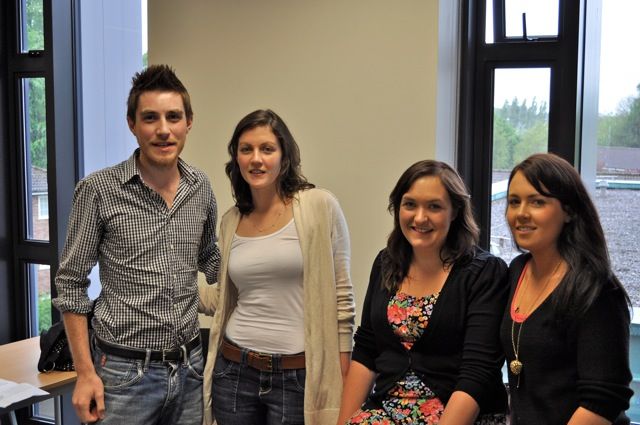UCC Science Shop pilot as example of civically engaged

A year on: UCC Science Shop pilot as example of civically engaged ...
Participating students from Science Shop projects in 2010/11 (L-R): Michael Quirke, Monica Coll, Siobhan Scully, Mary Ryan, Master of Social Work (MSW) students ...
Four recent pilot Science Shop projects in UCC have successfully shown that on-going university activities can exemplify civic mindedness and engage academia with the wider community.
The Science Shop in UCC received close to thirty project submissions in June 2010 and four projects were carried out on behalf of three civil society groups for the first year pilot. The participating students were second year Master of Social Work (MSW) students who undertook projects submitted to the UCC Science Shop as their Master’s research.
Science Shops provide independent, participatory research support in response to concerns expressed by civil society organisations. The word ‘shops’ in the traditional sense is a bit misleading as they are small entities that carry out research in a wide range of disciplines -usually free of charge - on behalf of or with civil society organisations i.e. community groups, non-government organisations, schools.
All four students recently presented the findings of their Science Shop projects to the relevant community group and will provide each group with a short report, modified from their thesis, including recommendations arising from the research. Feedback from students, supervisors and the community organisations involved in the pilot has been largely positive and students particularly noted feeling an increased responsibility for their work as they wished to accurately represent the experiences of those who participated in their studies, but also felt very much more engaged with the research for the same reason.
That Science Shops respond to civil society’s needs for expertise and knowledge is a key element that distinguishes them from other knowledge transfer mechanisms. One of the recent UCC Science Shop projects investigated respite services for the carers of adults and children with intellectual disabilities. The community group who proposed this project has been very complimentary with regard to the standard of the student research, to such extent that they plan to add the findings of this study to other evidence to present to the Oireachtas as part of a broader submission on respite services in Ireland.
Community based research, with the Science Shop as one example, has the potential not only to develop the broader skill sets of students but also to enhance their social awareness through facilitating their involvement in research which is reflective of societal needs. This link was explored further at the recent NAIRTL annual conference in Galway, a subtheme of which was ‘civic engagement and social responsibility’. Siobhan Scully, student researcher in a recent Science Shop project, was the only student presenter at this national event and she gave insights into her experiences of community based research and the impact on her learning.
Many civil society groups are faced with increasing pressure to provide empirical evidence to support practical and advocacy activities and many lack the resources to conduct the research themselves. Shop Sciences, through linking with the student research base, are able to facilitate this research to be carried out on with none or minor cost implications. The proposals from community organisations must meet a number of criteria before being accepted i.e. research is possible on the topic, the results will be made public, the findings are relevant to a wide range of people, the research question is not commercial, and the organisation is able to use the research findings. Such requirements aim to ensure that the Science Shop supports groups and organisations with limited resources particularly those whose activities which may be of strategic importance from the point of view of impact or of potential value to weak or marginalised groups.
The National Strategy for Higher Education, i.e. the Hunt report, highlights the needs to develop a student base so that they become “citizens who will add to the richness of society - as parents, community leaders and teachers - and in their chosen area of work they will be the productive engine of a vibrant and prosperous economy”. The UCC Science Shop has shown one example of how this might be realised and is one of several initiatives happening across Europe that work to harness the research strength of Higher Education Institutions to support civil society.
